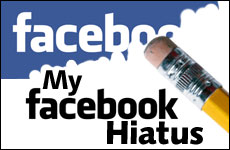 Iran’s Attack on Israel
Iran’s Attack on Israel


5 min read
Breaking free from the 'being liked' trap.
The silence in my house is refreshing, yet slightly unnerving. Not that I remembered much background noise before pulling the plug on my Facebook account, calling a month's hiatus. Rather, the mental chatter is gone; all the conversations, comment threads, instant messages, and status updates, having generated a nonstop stream of counter-conversations and running commentaries (not the friendly or forgiving kind) in my head, are becoming a distant memory.
It happened quickly. I'd gotten hurt by something someone said or didn't say, delirious from sleep deprivation around 1 am, had lost even more sleep worrying about it, and texted my tale of woe the next morning to a friend, who bluntly responded, "So delete Facebook."
What?
After a stunned pause, staring at the screen, I realized I'd been toying with this idea for a long time. Watching everyone else's relationships unfold right before my eyes, and judging my own relationships by comparing them to others, was crippling, mentally and emotionally. Who's more liked? Who gets more 'likes,' wall posts, and responses to their comments on comment threads? Why do people take such a long time to respond to me, when they're clearly responding to other people? Why did my number of friends go down??
Related Article: Facebook Friends
Why did my number of friends go down?? Why do people take such a long time to respond to me, when they're clearly responding to other people?
The 'what do they think of me' syndrome wasn't the only issue. There was the constant feeling of treading water yet not quite staying afloat: how to keep up with the overwhelming number of interactions, status updates, birthdays, events... was I paying enough attention to x? How many birthdays did I miss? Did I forget to answer y's message? Did I offend z by not mentioning him/her in a post? Or with a snarky response to his/her joke? All this, without facial expressions and vocal inflections to gauge the other person's response, something a coworker called a "disconnect of human emotions."
It's no wonder I was frequently awake until the wee hours of the morning, aware that I had to be alert for work the next day. As a result, I was frequently in a sour mood and wasn't getting along with many people that mean a lot to me. Misunderstandings and arguments erupted, resentments festered, and a general sense of unease permeated many of my interactions.
Looking back at my sleepless nights wandering the empty streets of Facebook, one thing became crystal clear: My ego was having a field day. It's demanding, constricted, and always has to be right. It wants very badly to be liked and to look good. It's never satisfied; a bottomless pit of approval seeking, dependent on everyone's opinion for its self worth and happiness, and therefore a victim of outside circumstances.
In contrast, the soul's voice is quiet, calm, unassuming, open, expansive, and willing to see all sides of the story. It wants to make a difference and to be good for its own sake. It doesn't demand that others behave or react a certain way, and it doesn't need specific conditions in order to be happy. It's content with what is, grateful no matter what the outside circumstances. If it has a desire to change things for the better, it does so, knowing that it's a co-creator of its own life, a partner with God.
Every once in a while, a quiet small voice would remind me of a key lesson I learned: my job was not to be liked, but to make a difference. I clearly got caught up in the 'being liked' trap, which was very disempowering. I was making myself a victim rather than a co-creator of my life.
In social media, you can choose to act from a soul-based perspective, which makes use of all the wonderful benefits Facebook has to offer -- connections, reunions, photos, birthdays, silly videos to cheer people up, and event postings. But if you choose to let the ego run the show, it's not pretty. Facebook was giving my ego a chance to use its every tactic to trip me up every chance it had.
So what have I been doing without Facebook? Meditating. Catching up on lectures. Reading. Hanging out with my nephews and niece, having conversations over bagels and cream cheese, dodging flying objects, and playing hide and seek instead of being transfixed by a computer screen or a Blackberry. Recently I've enjoyed dinners in my sukkah, sometimes with friends (including a new one) and family, sometimes alone with my thoughts or a book. Experiencing real life rather than virtual life. I'm also getting a lot more accomplished.
I'm feeling somewhat disconnected from my 868 contacts.
I'm only two weeks into this hiatus, and truthfully I'm feeling somewhat disconnected from my 868 contacts. But I'm appreciating the face-to-face interactions and the nuances of real conversations.
I assumed I was not alone in this social media preoccupation (I'll even venture to call it a true addiction) phenomenon, but the proof came in an article about social media-induced depression among teens. [ http://www.cbsnews.
If I do return to Facebook, I'll know how to be more balanced about it, using it as a tool rather than a crutch. Either way, I've come closer to experiencing my true self, having been more present in my life and open to real, more meaningful connections. Which is a good reason for Facebook to exist in the first place.
